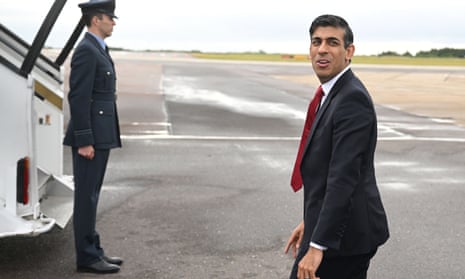Illegal migration bill returns to Commons as PM heads to Vilinius
As Rishi Sunak set off for Lithuania for the crunch two-day Nato summit in Vilnius, back home the controversial illegal migration bill will today make a return to the House of Commons.
After taking a beating in the House of Lords – where it has been defeated no less than 20 times – last night the government was forced to announce new amendments to the proposed legislation, in what is expected to be seen as a win for Tory rebels.
Key changes include that the law will not apply retrospectively to migrants who have already crossed the Channel.
The Home Office also said it had brought in “safeguards” after being subjected to House of Lords scrutiny.
But when it comes to bans on re-entry, settlement and citizenship, the law will still apply retrospectively to those who arrived illegally on or after the date of the bill’s introduction: 7 March.
The Home Office said it would ensure the list of definitions of “serious and reversible harm” cannot be changed in secondary legislation.
Other changes include that the first tier tribunal can grant immigration bail after eight days to unaccompanied children who have been detained for the purpose of removal. This is a reduction on the proposed 28 days.
Pregnant women cannot be detained for more than 72 hours, but that period can be extended to seven days if it is authorised by a minister.
MPs will vote on the changes today and on the Lords amendments, which you can find here.
I will be looking after the politics blog today. If you have any tips or suggestions, please get in touch: [email protected]
Key events
Speaking to the treasury select committee, Charlotte Harrison, the interim CEO of home financing at Skipton Building Society said she expects to see even more “financial stress” for customers than previously amid high interest rates.
The Treasury select committee is hearing evidence from senior directors at major UK banks on the mortgage market and how it is being affected by rising interest rates (see also 10.12am).
Later, at 11.30am, Steve Barclay, the health and social care secretary, and his ministers will be facing questions in the House of Commons.
And after 12.30am the Commons will consider Lords amendments of the illegal migration bill (see 9.40am).

Ben Quinn
Priti Patel has said key pillars of the government’s flagship illegal migration bill have been abandoned as a cabinet minister insisted the government could “make real and clear progress” on stopping small-boat crossings in the Channel.
The former home secretary tweeted on Tuesday: “We were told that the illegal migration bill would ‘stop the boats’. Key pillars of that bill have now been abandoned.”
She also used her Twitter account to highlight the fact that her former department was now spending £500,000 a day on 5,000 empty hotel beds as a buffer for higher than expected numbers of migrants crossing the Channel. Officials told the Commons public accounts committee the Home Office maintains the buffer in an attempt to avoid a repeat of problems at the Manston processing centre in Kent.

Julia Kollewe
Two-year fixed mortgage rates in the UK have risen to the highest level since the 2008 financial crisis, adding to the pressure on households.
A typical two-year deal has risen to 6.66%, up from 6.63% on Monday, according to the data provider Moneyfacts.
It is the highest rate since 2008 – bad news for homeowners whose deals are coming to an end and who need to remortgage soon. It means they will be paying hundreds of pounds more each month.
The rise takes the cost of two-year mortgages slightly above the peak of 6.65% reached last autumn, when the borrowing market was rocked by Kwasi Kwarteng’s “mini-budget” package of unfunded tax cuts.
The average five-year fixed mortgage rate rose to 6.17% on Tuesday from 6.13% on Monday.
Moneyfacts said there were fewer deals available; a total of 4,344 residential mortgage products, down from 4,631 on Monday.
Savings rates have not risen as fast as mortgage rates. The average rate on an easy access savings account was unchanged on Tuesday at 2.53%.
Suella Braverman has said she hopes the amendments to the illegal migration bill will help the “crucial” new law pass “swiftly”.
It will also, the home secretary said, “send a clear message that the exploitation of children and vulnerable people, used by criminals and ferried across the Channel, cannot continue”.
Jeremy Hunt has responded to new ONS figures showing that unemployment has jumped above expectations to 4% in the three months to May (from 3.8% the previous quarter). Meanwhile, wages increased at the joint-highest rate on record.
The chancellor said:
Our jobs market is strong, with unemployment low by historical standards. But we still have around 1m job vacancies, pushing up inflation even further.
Our labour market reforms – including expanding free childcare next year – will help to build the high-wage, high-growth, low-inflation economy we all want to see.
Boris Johnson has offered his congratulations to Sweden after last night’s news that Turkey has agreed to support the country’s Nato bid.
The former PM tweeeted:
Great news for Sweden and our collective security. And the right move by President Erdogan and Turkey. Now for Ukraine. https://t.co/0DDgcKL5j4
— Boris Johnson (@BorisJohnson) July 11, 2023
Illegal migration bill returns to Commons as PM heads to Vilinius
As Rishi Sunak set off for Lithuania for the crunch two-day Nato summit in Vilnius, back home the controversial illegal migration bill will today make a return to the House of Commons.
After taking a beating in the House of Lords – where it has been defeated no less than 20 times – last night the government was forced to announce new amendments to the proposed legislation, in what is expected to be seen as a win for Tory rebels.
Key changes include that the law will not apply retrospectively to migrants who have already crossed the Channel.
The Home Office also said it had brought in “safeguards” after being subjected to House of Lords scrutiny.
But when it comes to bans on re-entry, settlement and citizenship, the law will still apply retrospectively to those who arrived illegally on or after the date of the bill’s introduction: 7 March.
The Home Office said it would ensure the list of definitions of “serious and reversible harm” cannot be changed in secondary legislation.
Other changes include that the first tier tribunal can grant immigration bail after eight days to unaccompanied children who have been detained for the purpose of removal. This is a reduction on the proposed 28 days.
Pregnant women cannot be detained for more than 72 hours, but that period can be extended to seven days if it is authorised by a minister.
MPs will vote on the changes today and on the Lords amendments, which you can find here.
I will be looking after the politics blog today. If you have any tips or suggestions, please get in touch: [email protected]


